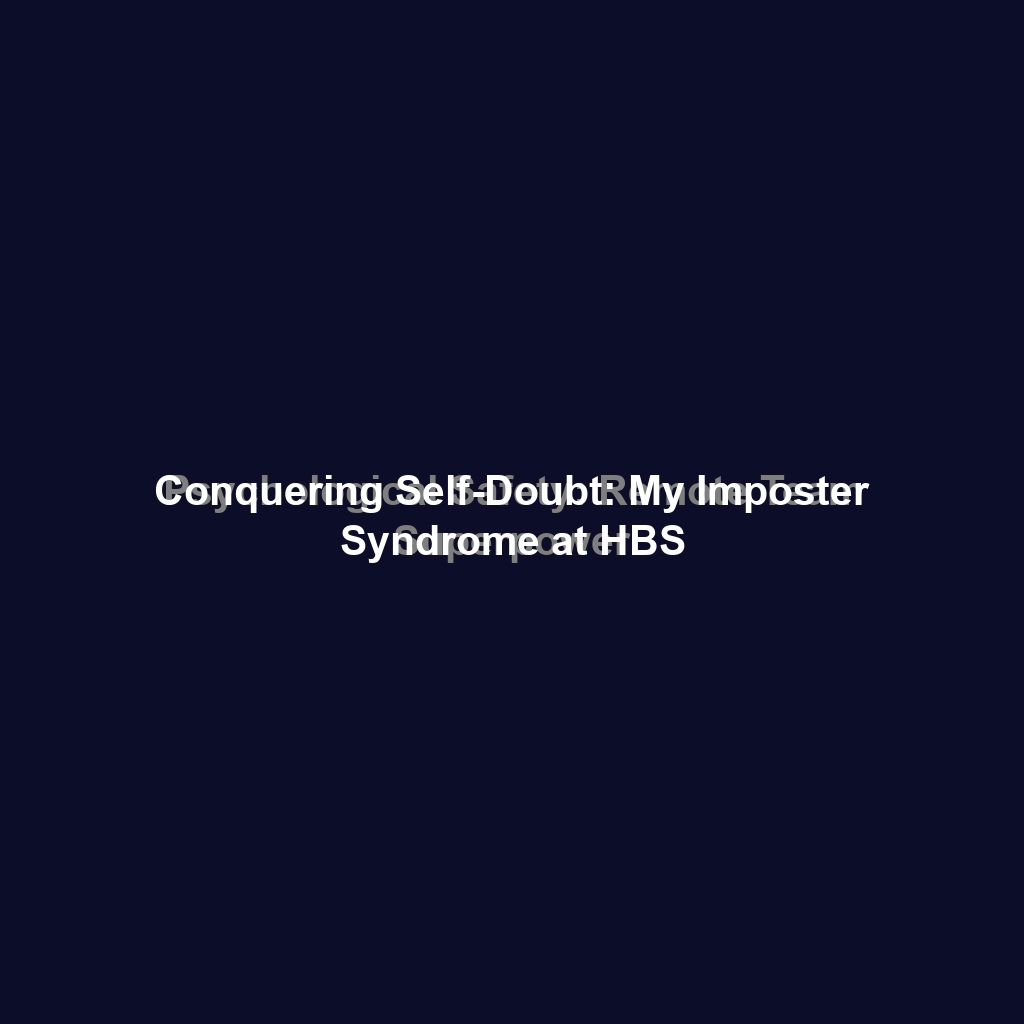Harvard Business School (HBS). Just the name conjures images of brilliant minds, cutting-edge strategies, and future titans of industry. For many, getting accepted feels like reaching the summit. But for some, including myself, it can also mark the beginning of a new internal battle: the dreaded Imposter Syndrome.
I remember vividly the first week of classes. Surrounded by classmates who seemed effortlessly confident, articulate, and accomplished, a nagging voice in my head kept whispering, “You don’t belong here. You’re not smart enough. You’re going to be exposed.” This wasn’t just nerves; it was full-blown Imposter Syndrome, and it threatened to derail my entire HBS experience. It’s something I’ve since learned is incredibly common, even at the highest echelons of academia and business leadership. If you’re feeling this way, know you’re not alone.
The Prevalence of Imposter Syndrome at Elite Institutions
Imposter Syndrome, a psychological pattern in which individuals doubt their accomplishments and have a persistent, often internalized fear of being exposed as a fraud, is surprisingly widespread, especially in high-achieving environments like HBS. Why? Several factors contribute:
- The Concentration of Talent: HBS attracts exceptionally talented individuals from diverse backgrounds. Being surrounded by so many accomplished peers can make anyone feel like they’re falling short. Imagine coming from a smaller company where you were a star performer, suddenly finding yourself surrounded by people who’ve already run entire divisions of Fortune 500s. That’s the HBS experience for many.
- The Pressure to Succeed: The stakes at HBS are high. The curriculum is rigorous, the competition is fierce, and the expectation to land a coveted job after graduation is ever-present. This pressure can amplify feelings of inadequacy.
- The “Duck Syndrome”: A term often used in elite academic circles, “Duck Syndrome” refers to the appearance of effortless grace on the surface while paddling furiously beneath the water. Everyone *looks* like they’re effortlessly acing the cases and networking events, but the reality is often very different. This creates a distorted perception of everyone else’s struggles, fueling self-doubt.
Key Insight: Imposter Syndrome thrives in environments where achievement is highly valued and comparison is rampant. Understanding this dynamic is the first step to overcoming it.
My Personal Battle with Self-Doubt at HBS
My background was in engineering before HBS, and while I had some leadership experience, I lacked the deep financial or consulting expertise that many of my classmates possessed. Early case discussions were particularly daunting. Students with prior finance experience would effortlessly dissect complex financial statements, while I struggled to keep up. I found myself hesitating to speak up, afraid of saying something wrong and exposing my perceived ignorance.
One particularly harrowing experience involved a case study on a complex leveraged buyout. I spent hours preparing, but during the class discussion, I completely froze. I knew the answer the professor was looking for, but the pressure and the fear of being wrong paralyzed me. After class, I felt deflated and convinced that I was a complete failure. I even considered dropping out. It wasn’t just a fear of failing a grade, but a fear of disappointing the admissions committee who had clearly made a “mistake” in admitting me.
This feeling persisted, coloring my interactions and affecting my confidence. I started avoiding social events, convinced that I wouldn’t have anything valuable to contribute. My grades, while solid, were a constant source of anxiety. I compared myself relentlessly to my classmates, focusing on their strengths and downplaying my own.
Strategies and Coping Mechanisms That Worked for Me
Overcoming Imposter Syndrome wasn’t easy, but it was essential for me to thrive at HBS and beyond. Here are some specific strategies and coping mechanisms that proved invaluable:
1. Recognizing and Acknowledging the Feeling
The first step is recognizing that you’re experiencing Imposter Syndrome. It sounds simple, but it’s crucial. Instead of dismissing your feelings as “just nerves” or “low self-esteem,” acknowledge them for what they are: a common psychological phenomenon. Name it. “I’m feeling Imposter Syndrome right now.” This simple act of naming can help you detach from the feeling and realize it’s not necessarily a reflection of reality.
I started keeping a journal where I wrote down my feelings of self-doubt. Seeing them on paper helped me realize how irrational they often were. For example, after that disastrous leveraged buyout case, I wrote down all the reasons why I thought I had failed. Then, I challenged each one. Was I truly ignorant, or was I simply less experienced in finance than some of my classmates? Was freezing up a sign of incompetence, or a normal reaction to pressure? This process of self-reflection was incredibly powerful.
2. Challenging Negative Thoughts
Imposter Syndrome thrives on negative self-talk. You need to actively challenge these thoughts with evidence and logic. Ask yourself:
- What evidence supports this thought?
- What evidence contradicts this thought?
- Am I making any assumptions or biases?
- What would I tell a friend who was feeling this way?
One technique I found helpful was to create a “success file.” Whenever I received positive feedback, aced an assignment, or achieved a goal, I would add it to the file. When I started feeling overwhelmed by self-doubt, I would pull out the file and remind myself of my accomplishments. This provided concrete evidence to counteract the negative thoughts.
3. Focusing on Learning and Growth, Not Just Performance
HBS is a learning environment. It’s okay to make mistakes. Shift your focus from achieving perfect scores to embracing the learning process. View challenges as opportunities for growth, not as threats to your self-worth.
I started actively seeking out opportunities to learn from my mistakes. After stumbling in class, I would approach the professor during office hours and ask for clarification. I joined study groups with classmates who excelled in areas where I struggled. I stopped comparing myself to others and started focusing on my own progress. This shift in mindset significantly reduced my anxiety.
4. Seeking Support and Mentorship
Talk to someone you trust about your feelings. Confide in a friend, family member, mentor, or therapist. Sharing your struggles can help you gain perspective and realize that you’re not alone. HBS also has excellent counseling resources available to students.
I connected with a second-year student who had also struggled with Imposter Syndrome during her first year. She shared her experiences and offered invaluable advice. Knowing that someone else had navigated the same challenges and emerged successfully gave me hope and encouragement. I also found a mentor, a successful entrepreneur who had graduated from HBS years earlier. His perspective and guidance helped me see the bigger picture and develop a long-term career strategy.
5. Celebrating Small Victories
Acknowledge and celebrate your accomplishments, no matter how small. Give yourself credit for your hard work and effort. Don’t wait for major milestones to feel proud of yourself.
I started keeping a “gratitude journal” where I wrote down three things I was grateful for each day. This helped me focus on the positive aspects of my life and appreciate my accomplishments. I also made a conscious effort to celebrate small victories, like finally understanding a complex financial concept or contributing meaningfully to a class discussion.
Key Insight: Overcoming Imposter Syndrome is an ongoing process, not a one-time fix. Be patient with yourself, and celebrate your progress along the way.
Actionable Advice for Aspiring Leaders Struggling with Self-Doubt
Imposter Syndrome doesn’t disappear after graduation. It can continue to plague you throughout your career. Here’s some actionable advice for aspiring leaders to foster authenticity and confidence:
- Embrace Vulnerability: Don’t be afraid to admit what you don’t know. Authenticity is a powerful leadership trait. People respect leaders who are honest about their limitations and willing to learn from others. I once worked with a CEO who readily admitted he wasn’t an expert in technology, but he surrounded himself with brilliant technologists and empowered them to lead. His vulnerability fostered trust and innovation within the company.
- Focus on Your Strengths: Identify your unique talents and skills, and leverage them to make a meaningful contribution. Don’t try to be good at everything. Focus on what you excel at and delegate the rest. During a challenging project at my first job after HBS, I realized that my strength was in communication and team building. I focused on facilitating collaboration and ensuring everyone was aligned, which ultimately led to the project’s success, even though other team members had more technical expertise.
- Seek Feedback and Act on It: Regularly solicit feedback from colleagues, mentors, and subordinates. Use this feedback to identify areas for improvement and develop a growth plan. Don’t take criticism personally; view it as an opportunity to learn and grow.
- Practice Self-Compassion: Treat yourself with the same kindness and understanding that you would offer a friend. Don’t beat yourself up over mistakes. Learn from them and move on.
- Remember Your “Why”: Connect with your purpose and values. Why are you pursuing this career path? What impact do you want to make on the world? When you’re clear about your “why,” it’s easier to overcome self-doubt and stay motivated.
Fostering Authenticity and Confidence
Authenticity and confidence are not innate qualities; they are cultivated through self-awareness, self-acceptance, and intentional action. Here’s how to cultivate these traits:
1. Know Your Values
What’s truly important to you? What principles guide your decisions and actions? When you’re aligned with your values, you’ll feel more authentic and confident.
During my time at HBS, I realized that my core values were impact, integrity, and continuous learning. I made a conscious effort to align my career choices with these values. This helped me make decisions that felt authentic and fulfilling, which in turn boosted my confidence.
2. Embrace Your Imperfections
Nobody is perfect. Embrace your flaws and vulnerabilities. They make you human and relatable. Trying to project a perfect image is exhausting and ultimately unsustainable. People connect with authenticity, not perfection.
I learned to be more open about my struggles and challenges. Sharing my vulnerabilities made me more approachable and allowed me to build deeper connections with others. It also freed me from the pressure of trying to be someone I wasn’t.
3. Take Calculated Risks
Step outside your comfort zone and challenge yourself. Taking calculated risks can build confidence and expand your horizons. Don’t be afraid to fail; view it as a learning opportunity.
One of the best things I did at HBS was to participate in the startup incubator program. I had no prior experience in entrepreneurship, but I was passionate about solving a particular problem. The experience was incredibly challenging, but it taught me invaluable lessons about resilience, leadership, and innovation. It also gave me the confidence to pursue my own entrepreneurial ventures after graduation.
4. Celebrate the Success of Others
Authentic leaders celebrate the success of others without feeling threatened or inadequate. They understand that collaboration and teamwork are essential for achieving shared goals. Practicing genuine appreciation for others’ accomplishments builds positive relationships and creates a more supportive environment.
I made a conscious effort to support my classmates and celebrate their achievements. Not only did it feel good, but it also created a sense of camaraderie and mutual respect. I realized that their success didn’t diminish my own; in fact, it often inspired me to strive for even greater things.
5. Continuous Learning
Commit to being a lifelong learner. Stay curious, seek out new knowledge, and adapt to changing circumstances. Continuous learning will not only enhance your skills and expertise but also boost your confidence and resilience.
Even after graduating from HBS, I continue to invest in my professional development. I attend industry conferences, read widely, and network with other leaders in my field. This continuous learning helps me stay relevant and confident in a rapidly changing world.
Key Insight: Authentic leadership isn’t about pretending to be someone you’re not; it’s about embracing your true self and leading with integrity and compassion.
Beyond HBS: Applying These Lessons in the Real World
The lessons I learned about overcoming Imposter Syndrome at HBS have been invaluable throughout my career. I’ve found that these strategies are applicable in a wide range of professional settings, from leading teams to navigating challenging negotiations. The ability to recognize and manage self-doubt is a critical skill for any leader.
For example, I once had to present a complex strategic plan to a board of directors composed of seasoned executives. The stakes were high, and I felt the familiar pangs of Imposter Syndrome creeping in. But I remembered the strategies I had learned at HBS. I prepared meticulously, focusing on the value I was bringing to the table. I reminded myself of my accomplishments and the positive impact I had made in the past. And during the presentation, I embraced vulnerability, acknowledging areas where I needed their expertise. The presentation was a success, not just because of the content, but because of the authenticity and confidence I brought to the table.
Furthermore, the importance of seeking feedback and acting on it has become a cornerstone of my leadership style. I regularly conduct 360-degree reviews with my team, soliciting honest feedback about my performance. This feedback helps me identify blind spots and improve my effectiveness as a leader. It’s not always easy to hear criticism, but I’ve learned to view it as a gift. It’s an opportunity to grow and become a better version of myself.
Conclusion: Embracing Your Potential
Imposter Syndrome is a common experience, especially in high-achieving environments like HBS. But it doesn’t have to hold you back. By recognizing the feeling, challenging negative thoughts, focusing on learning and growth, seeking support, and celebrating small victories, you can overcome self-doubt and unlock your full potential. Remember, you were admitted to HBS for a reason. You have something valuable to contribute. Embrace your unique talents and skills, and don’t be afraid to shine. The world needs your leadership.
The journey through HBS, and indeed, through life, is about continuous learning and self-discovery. Embracing vulnerability, fostering authenticity, and cultivating confidence are not destinations, but rather ongoing processes. As you navigate the challenges ahead, remember the lessons you’ve learned and the strength you’ve gained. You have the power to overcome Imposter Syndrome and become the leader you were meant to be.
This article was optimized and published by Content Hurricane.


